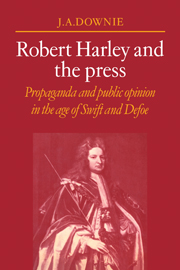Crossref Citations
This Book has been
cited by the following publications. This list is generated based on data provided by Crossref.
Downie, J.A.
1981.
Polemical strategy and swift'sThe conduct of the allies.
Prose Studies,
Vol. 4,
Issue. 2,
p.
134.
Harris, Michael
1984.
Britain in the Age of Walpole.
p.
189.
Brooks, Colin
1984.
The country persuasion and political responsibility in England in the 1690s∗.
Parliaments, Estates and Representation,
Vol. 4,
Issue. 2,
p.
135.
Pocock, J. G. A.
1985.
The History of British Political Thought: The Creation of a Center.
Journal of British Studies,
Vol. 24,
Issue. 3,
p.
283.
Rembert, James A. W.
1988.
Swift and the Dialectical Tradition.
p.
144.
Winton, Calhoun
1993.
The Tatler:From half‐sheet to book.
Prose Studies,
Vol. 16,
Issue. 1,
p.
23.
Downie, J.A.
1993.
Stating facts right about Defoe'sreview.
Prose Studies,
Vol. 16,
Issue. 1,
p.
8.
Sherman, Sandra
1994.
The secret history ofthe secret history:Grub street decorum inRobinson Crusoe.
Prose Studies,
Vol. 17,
Issue. 2,
p.
1.
Swift, Jonathan
1995.
Gulliver’s Travels.
p.
3.
Fox, Christopher
1995.
Jonathan Swift Gulliver’s Travels.
p.
3.
Statt, Daniel
1995.
The case of the Mohocks : Rake violence in Augustan London1.
Social History,
Vol. 20,
Issue. 2,
p.
179.
Baird, John D.
1997.
Whig and Tory Panegyrics: Addison's The Campaign and Philips's Bleinheim Reconsidered.
Lumen: Selected Proceedings from the Canadian Society for Eighteenth-Century Studies,
Vol. 16,
Issue. ,
p.
163.
Raymond, Joad
1998.
The newspaper, public opinion, and the public sphere in the seventeenth century.
Prose Studies,
Vol. 21,
Issue. 2,
p.
109.
Raymond, Joad
1999.
The history of newspapers and the history of journalism: Two disciplines or one?.
Media History,
Vol. 5,
Issue. 2,
p.
223.
McBride, Ian
2001.
Political Discourse in Seventeenth- and Eighteenth-Century Ireland.
p.
169.
Kelly, Ann Cline
2002.
Jonathan Swift and Popular Culture.
p.
13.
Parsons, Nicola
2003.
Libertine Enlightenment.
p.
145.
Downie, J. A.
2004.
How useful to eighteenth-century English studies is the paradigm of the ‘bourgeois public sphere’?.
Literature Compass,
Vol. 1,
Issue. 1,
p.
**.
Black, Jeremy
2004.
Parliament and Foreign Policy in the Eighteenth Century.
Richetti, John
2005.
The Cambridge History of English Literature, 1660–1780.





